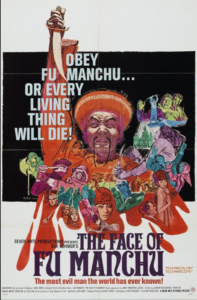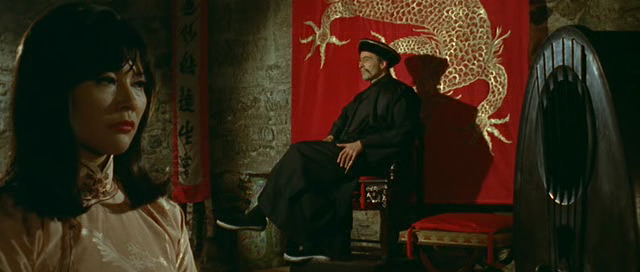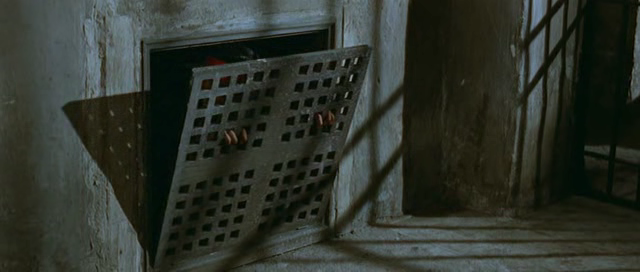“He’s cruel, callous, and brilliant — and the most evil and dangerous man in the world.”

Synopsis:
A British detective (Nigel Green) attempts to track down evil Fu Manchu (Christopher Lee), who has kidnapped a scientist (Joachim Fuchsberger) capable of creating a lethal potion from poppy plants.
|
|
Genres, Themes, Actors, and Directors:
- Christopher Lee Films
- Detectives and Private Eyes
- Kidnapping
- Scientists
- World Domination
Response to Peary’s Review:
As Peary notes, this film marked the return of “Sax Rohmer’s diabolical Chinese villain to the screen after a 33-year hiatus” (Boris Karloff last played Fu Manchu in 1932’s The Mask of Fu Manchu). It’s a surprisingly well-made genre flick in many ways, with “believable twenties flavor, fun [if unexceptional] performances by Lee and Green…, and an interesting storyline”. The set designs (full of colorful “chinoiserie” and period artifacts) are vibrant, and the story is appropriately nerve-wracking, given that Manchu and his equally fiendish daughter (played with intense sincerity by Tsai Chin) pose a truly frightening threat to the state of the world — as evidenced in a sequence demonstrating their ability to wipe out an entire town within seconds (the parallels with nuclear devastation are unmistakable). Indeed, Manchu’s ability to literally escape death — he’s “shown” beheaded in the film’s opening sequence, though we quickly learn this was someone else hypnotized to take his place — makes him one of the most frightening earthly villains in cinematic history. Note: Those easily offended by racial stereotypes should definitely stay away, as Manchu and his clan are clearly posited as a “yellow peril”.
Redeeming Qualities and Moments:
- Impressive set designs

- Several exciting sequences

Must See?
No, but it’s fun fare if you’re in the right mood.
Links:
|



One thought on “Face of Fu Manchu, The (1965)”
First viewing. Not a must at all, really. Ultimately forgettable. All too soon.
But the most interesting observation is the comparison between the performances of Lee and Green. The consummate professional, Lee takes full command front and center and never lets on that the material is beneath him (and everyone else). On the other hand, Green (a wonderful actor elsewhere – i.e., ‘The Ruling Class’) tries his best to earn his paycheck while never completely making us forget he’d rather be someplace else – i.e., in a better film.
Though produced well, the film is tepid at best. And things come to a deadening stand-still in the last 30 minutes, when you’re likely to stop caring one way or the other about anything having to do with anything.
Yet another head-shaker in terms of why Peary includes this title at all.